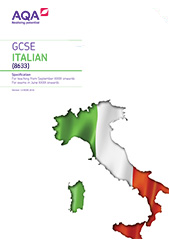3.3 Grammar
The grammar requirements for GCSE Italian are set out in two tiers: Foundation Tier and Higher Tier.
GCSE students will be expected to have acquired knowledge and understanding of Italian grammar during their course. In the exam they will be required to apply their knowledge and understanding, appropriate to the relevant tier of entry, drawing from the following lists. The examples in brackets are indicative, not exclusive. For structures marked (R), only receptive knowledge is required.
Students will be expected to develop and use their knowledge and understanding of this grammar progressively throughout their course.
Foundation Tier
Nouns
gender
singular and plural forms, including common irregulars eg la mano, il cinema, il/la ciclista, la foto, gli uomini
Articles
definite and indefinite
partitive
Adjectives
agreement
position
comparative and superlative: regular (più di, meno di, il più, il meno, tanto … quanto, cosí … come)
demonstrative (questo, quello)
indefinite: singular/plural usage (tutto, ogni, altro, qualche, alcuni)
possessive, short and long forms
interrogative (qual, quale, quali)
use of di and che after comparatives
Adverbs
formation
comparative and superlative
interrogative (come, quando)
adverbs of time and place (oggi, domani, qui, qua)
common adverbial phrases
ecco
Quantifiers/ intensifiers
common expressions of quantity (abbastanza, mezzo, molto, poco, un po’, tanto , troppo,quanto, quarto)
Pronouns
subject, including si
object: direct and indirect
direct and indirect object after an infinitive or gerund (R)
position and order of object pronouns (R)
reflexive
relative (che, cui) (quello che, il cui – (R))
disjunctive/emphatic
demonstrative
indefinite (nessuno, niente, ogni, qualcuno, qualcosa, qualche, uno, ognuno)
possessive (il mio etc – (R))
interrogative (chi, che, cosa, che cosa, quanto/a, quanti/e)
after ecco
use of ci, vi (R)
Verbs
regular and irregular verbs, including reflexive verbs
all persons of the verb, singular and plural
negative forms
interrogative forms
modes of address (tu, voi, Lei)
impersonal verbs (fa, bisogna)
verbs followed by an infinitive, with or without a preposition
tenses:
- present
- stare + gerund (R)
- imperfect (avere, essere, stare, fare) (other common verbs (R))
- immediate future (vengo subito, vado a fare la spesa)
- future (R)
- perfect with avere, essere + agreement
- conditional (vorrei + mi piacerebbe only)
- pluperfect (R)
Negatives
non, non … alcuno/a, non ancora, non … che, non … mai, non … né … né, non … niente, non … nessuno, non … nulla, non … più, non solo … ma anche , neanche, nemmeno, niente, nessuno, mai
Prepositions
common prepositions eg a, da, di, in, su, con, entro, fra, per, senza, tra
common compound prepositions eg vicino a, senza di, lontano da
contracted forms of prepositions + definite article (a, da, di, in, su)
use of da with present tense
Conjunctions
common coordinating conjunctions eg e/ed, ma, o (… o), oppure
common subordinating conjunctions eg quando, perché, anche se, poiché, se
Number, quantity, dates and time
- ordinal and cardinal numbers
- common quantities
- time and dates
Higher Tier
Students entering for Higher Tier assessments will be required to apply all grammar and structures listed for Foundation Tier, in addition to the new grammar and structures listed for Higher Tier.
Nouns
less common irregulars eg il dito, le dita
Adjectives
common irregular comparative and superlative, including il migliore, il peggiore
use of quello and bello before a noun
Adverbs
common irregular comparative and superlative, including meglio, peggio
Pronouns
use of ci, ne
combinations of direct and indirect pronouns and their modifications
position and order of object pronouns
impersonal use of si (si fanno i compiti)
use of plural adjectives after si
direct and indirect object after an infinitive or gerund
relative: il quale, il cui, quello che
possessive (il mio etc)
less common indefinite eg ciascuno, parecchi, qualsiasi, qualunque
Verbs
dependent infinitives (far vedere)
perfect infinitive eg after dopo
impersonal constructions (si dice, si crede)
tenses:
- stare + gerund
- imperfect
- future
- conditional
- pluperfect
- future perfect (R)
- conditional perfect (R)
passive voice
subjunctive mood: present, in commonly used expressions; past (R)
Prepositions
use of da with imperfect tense
